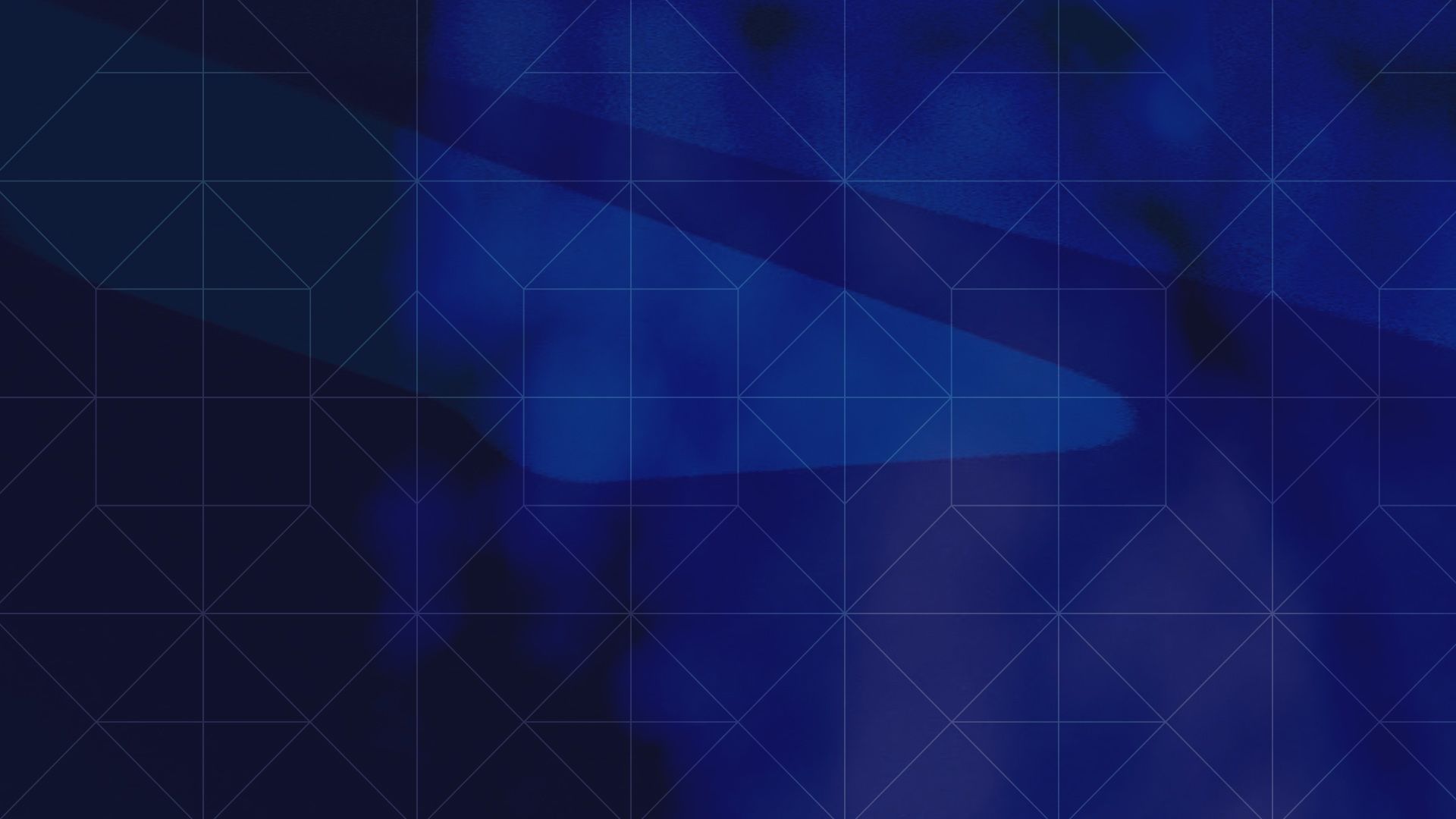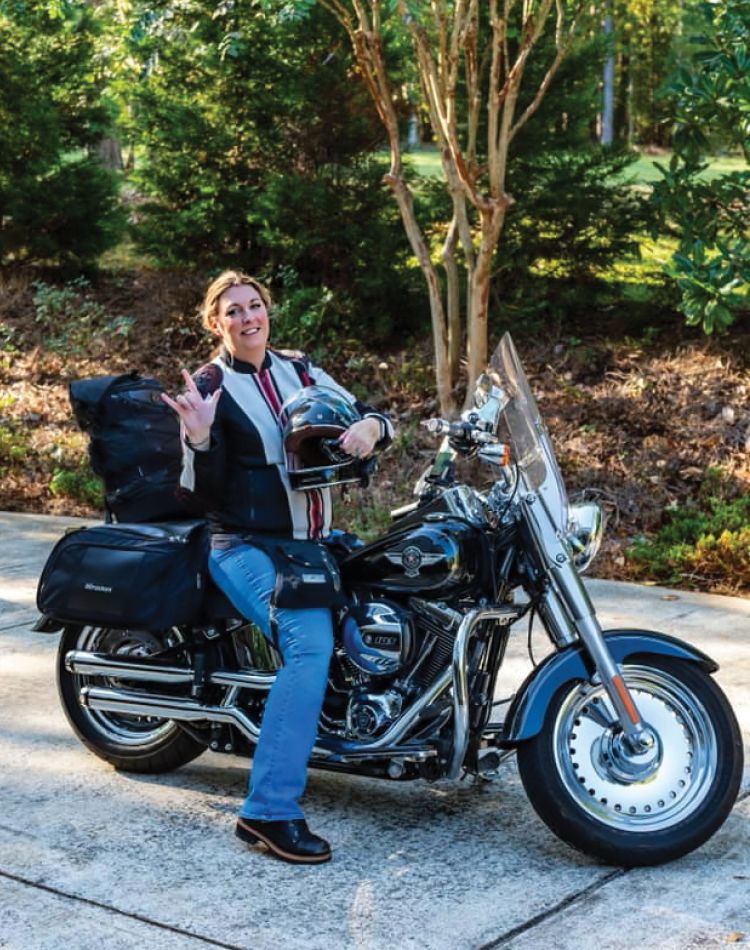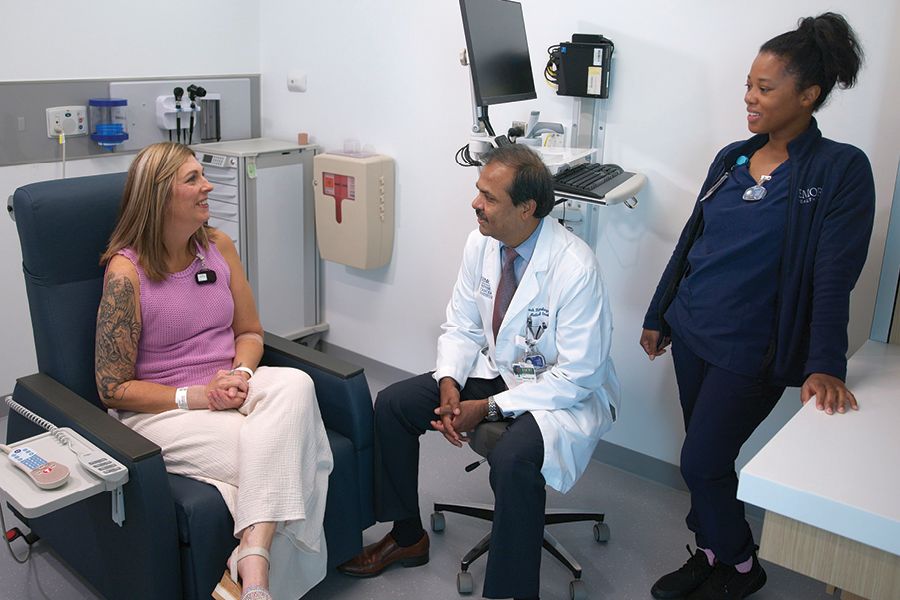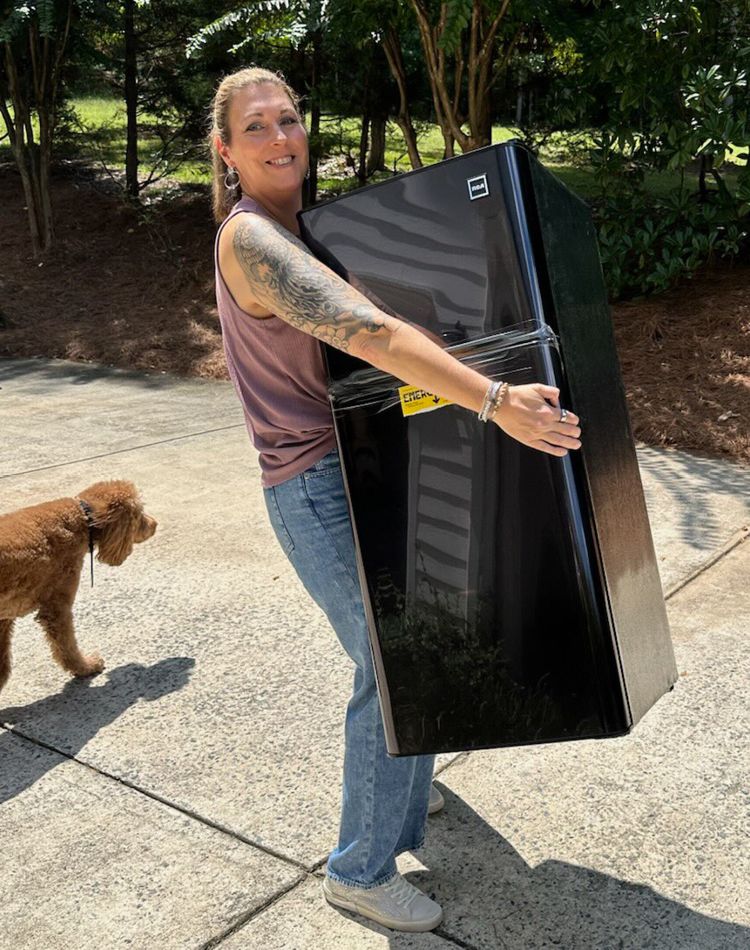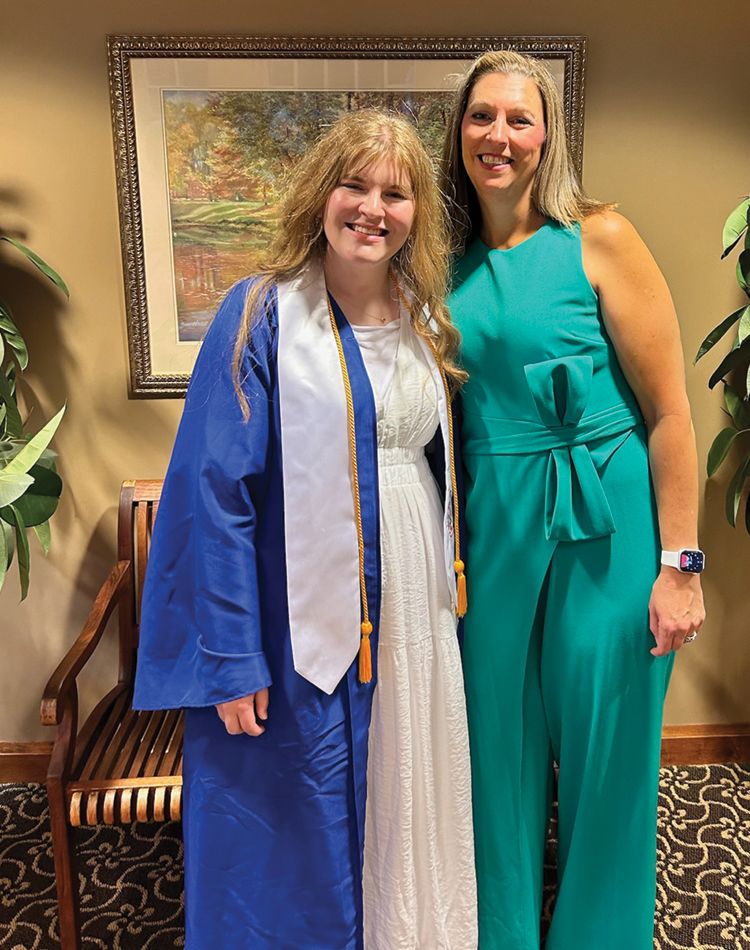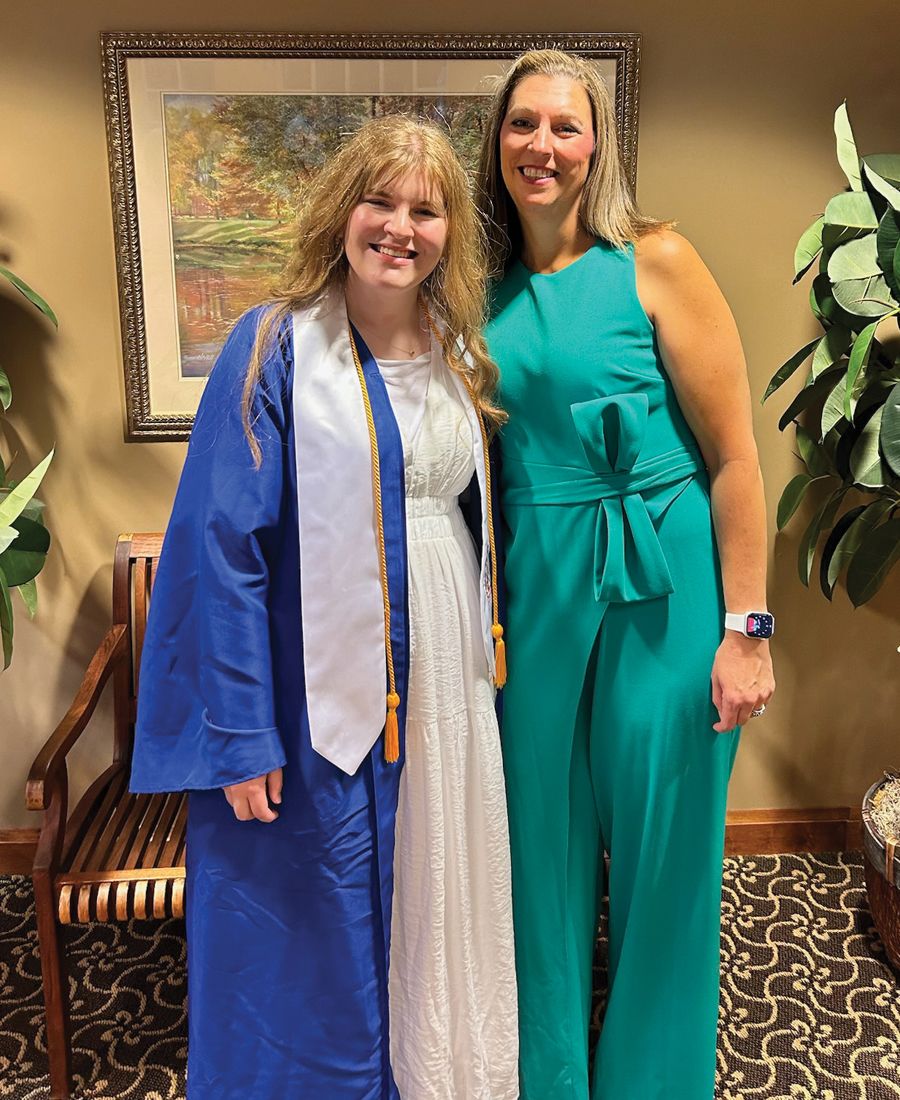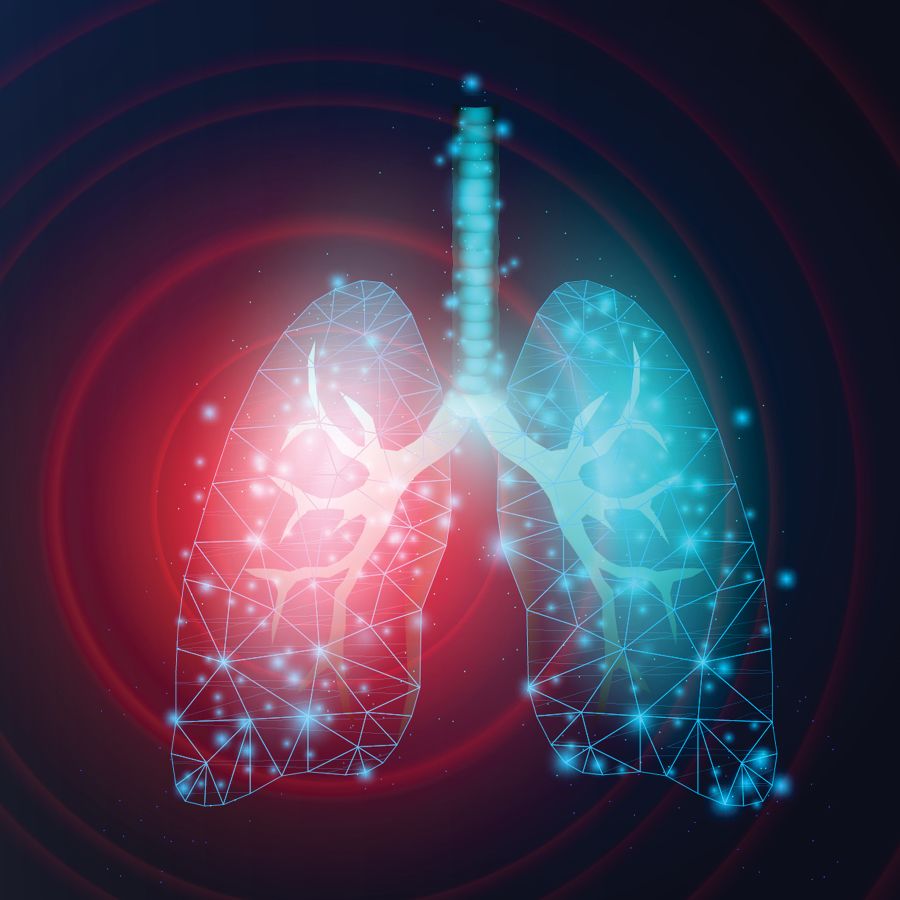Medical research, expert care
and targeted therapy changed
Christy Erickson’s life
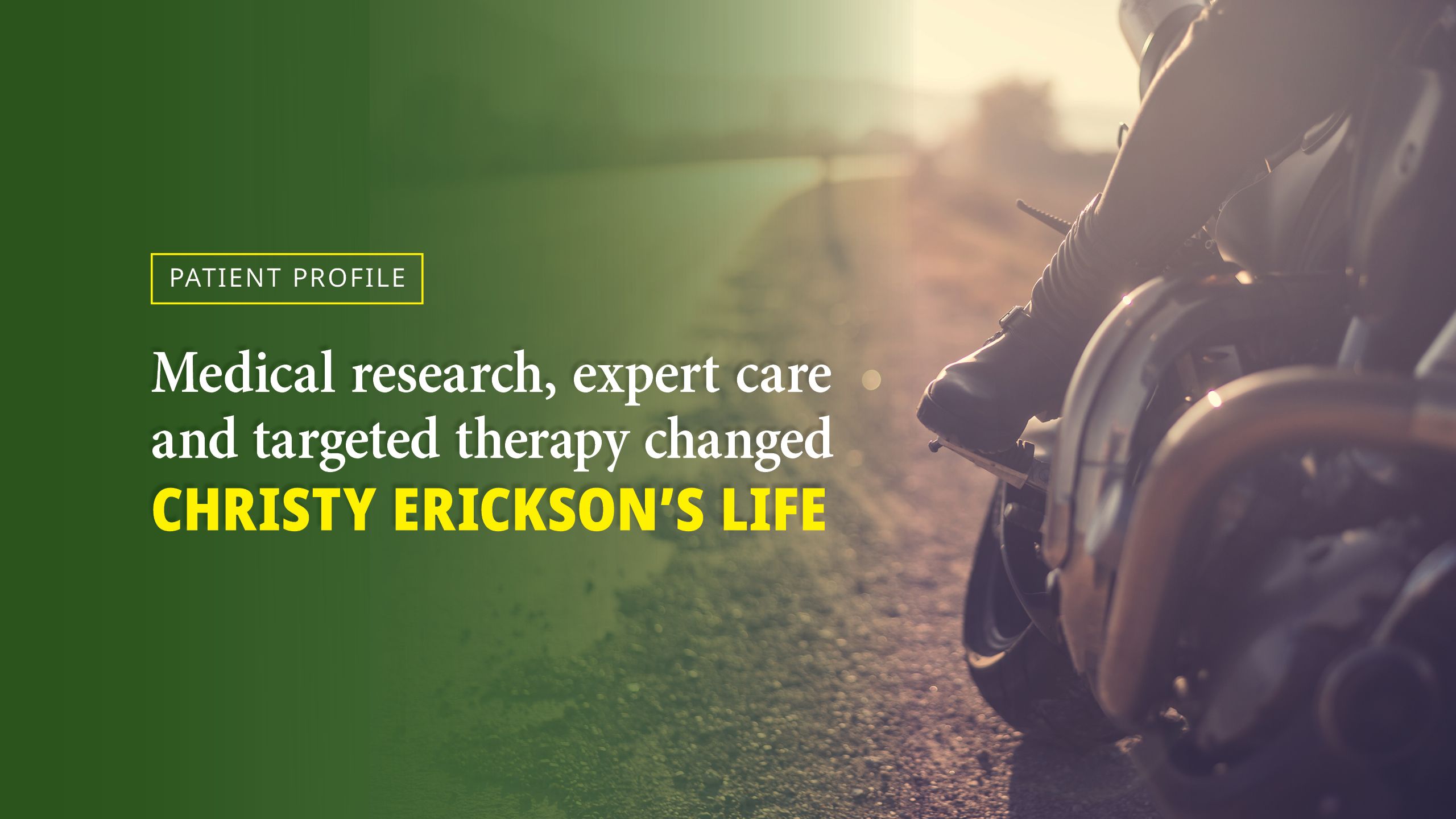
After her diagnosis, Erickson finally got the motorcycle she'd always wanted.
After her diagnosis, Erickson finally got the motorcycle she'd always wanted.
It seemed surreal and time seemed to stop when Christy Erickson first heard the word “cancer” applied to herself.
“I was scared. Really, really scared,” Erickson says, recalling her diagnosis. “It felt like I was in one of those old cartoons, where someone’s walking down the street and a piano falls on them out of nowhere. I kept waiting for the other shoe to drop.”
Although Erickson had no specific symptoms of lung cancer, the 41-year-old had been experiencing some persistent fatigue and noticed that cold and allergy symptoms seemed to linger longer than they normally should. A string of tests and misdiagnoses had delayed getting answers, but she kept pushing and searching for them. “It took months—so many tests, second opinions and sleepless nights—before I finally got the right diagnosis,” she says. “I kept thinking, if I had just accepted the first answer, where would I be now?”
Erickson is not someone who’d ever approached health issues passively. Long before her lung cancer diagnosis, she’d made a bold, proactive health decision. At age 26, due to a significant family history of breast cancer—including losing her own mother to the disease—Erickson opted to undergo a preventative double mastectomy, even though she didn’t test positive for a BRCA gene mutation that would indicate an increased risk for breast or ovarian cancer.
That’s why it was especially frustrating for Erickson not to have real answers about her health. As far back as 2006, small spots had shown up on a scan of her lungs, but an initial biopsy was inconclusive. For years, she underwent periodic monitoring with no clear diagnosis. “I kept thinking something wasn’t right, but no one could tell me what it was,” she recalls.
Her persistence provided some answers, but not much hope. In 2016, a biopsy eventually confirmed she had stage IV non-small cell lung cancer, a type of cancer that often carried a grim prognosis. At one point, the stay-at-home mother of two was advised to get her affairs in order, as it was deemed unlikely that she would see her children grow up. They were 10 and 7 at the time. Erickson wasn’t ready to give up. She wondered about her children’s futures, thinking, “What’s going to happen to them? Who’s going to take care of them?”
After her diagnosis, Erickson finally got the motorcycle she'd always wanted.
After her diagnosis, Erickson finally got the motorcycle she'd always wanted.
It seemed surreal and time seemed to stop when Christy Erickson first heard the word “cancer” applied to herself.
“I was scared. Really, really scared,” Erickson says, recalling her diagnosis. “It felt like I was in one of those old cartoons, where someone’s walking down the street and a piano falls on them out of nowhere. I kept waiting for the other shoe to drop.”
Although Erickson had no specific symptoms of lung cancer, the 41-year-old had been experiencing some persistent fatigue and noticed that cold and allergy symptoms seemed to linger longer than they normally should. A string of tests and misdiagnoses had delayed getting answers, but she kept pushing and searching for them. “It took months—so many tests, second opinions and sleepless nights—before I finally got the right diagnosis,” she says. “I kept thinking, if I had just accepted the first answer, where would I be now?”
Erickson is not someone who’d ever approached health issues passively. Long before her lung cancer diagnosis, she’d made a bold, proactive health decision. At age 26, due to a significant family history of breast cancer—including losing her own mother to the disease—Erickson opted to undergo a preventative double mastectomy, even though she didn’t test positive for a BRCA gene mutation that would indicate an increased risk for breast or ovarian cancer.
That’s why it was especially frustrating for Erickson not to have real answers about her health. As far back as 2006, small spots had shown up on a scan of her lungs, but an initial biopsy was inconclusive. For years, she underwent periodic monitoring with no clear diagnosis. “I kept thinking something wasn’t right, but no one could tell me what it was,” she recalls.
Her persistence provided some answers, but not much hope. In 2016, a biopsy eventually confirmed she had stage IV non-small cell lung cancer, a type of cancer that often carried a grim prognosis. At one point, the stay-at-home mother of two was advised to get her affairs in order, as it was deemed unlikely that she would see her children grow up. They were 10 and 7 at the time. Erickson wasn’t ready to give up. She wondered about her children’s futures, thinking, “What’s going to happen to them? Who’s going to take care of them?”
Finding the right care team

Erickson initially was referred to a cancer center in Arizona, but her physicians there had paused treatment plans as they awaited the results of genetic testing.
That’s when a doctor on her care team mentioned a name closer to Erickson’s home in Macon, Georgia: Suresh S. Ramalingam, a thoracic medical oncologist and executive director of Winship Cancer Institute of Emory University. “She said, ‘There’s this doctor in Atlanta that I really want you to meet,’” Erickson recalls. “By the time I got to him, he already had my genetic results—and it turned out he was the best person in the whole world to help me.”
Ramalingam, a lung cancer expert and clinical researcher, had led pivotal studies on osimertinib, a targeted therapy that works specifically for patients whose tumors carry a certain genetic mutation called EGFR. Erickson’s cancer had that genetic mutation.
Although she wasn’t part of the clinical trial Ramalingam led that tested osimertinib, she directly benefited from the medical research that made the drug more widely available. “Genetic testing was a game changer for me,” she says. “It wasn’t just about throwing treatments at my cancer—it was about understanding what would actually work for my body.”
“The type of cancer diagnosis Christy received had previously been associated with very poor outcomes,” says Ramalingam. “The research and development of this newer treatment, osimertinib, has enabled us to treat and manage this once-deadly form of cancer as more of a chronic condition, enabling people to live longer, fuller lives, like Christy with her family.”
Erickson meets with her care team for a follow-up visit.
Erickson meets with her care team for a follow-up visit.
Erickson initially was referred to a cancer center in Arizona, but her physicians there had paused treatment plans as they awaited the results of genetic testing.
That’s when a doctor on her care team mentioned a name closer to Erickson’s home in Macon, Georgia: Suresh S. Ramalingam, a thoracic medical oncologist and executive director of Winship Cancer Institute of Emory University. “She said, ‘There’s this doctor in Atlanta that I really want you to meet,’” Erickson recalls. “By the time I got to him, he already had my genetic results—and it turned out he was the best person in the whole world to help me.”
Erickson meets with her care team for a follow-up visit.
Erickson meets with her care team for a follow-up visit.
Ramalingam, a lung cancer expert and clinical researcher, had led pivotal studies on osimertinib, a targeted therapy that works specifically for patients whose tumors carry a certain genetic mutation called EGFR. Erickson’s cancer had that genetic mutation.
Although she wasn’t part of the clinical trial Ramalingam led that tested osimertinib, she directly benefited from the medical research that made the drug more widely available. “Genetic testing was a game changer for me,” she says. “It wasn’t just about throwing treatments at my cancer—it was about understanding what would actually work for my body.”
“The type of cancer diagnosis Christy received had previously been associated with very poor outcomes,” says Ramalingam. “The research and development of this newer treatment, osimertinib, has enabled us to treat and manage this once-deadly form of cancer as more of a chronic condition, enabling people to live longer, fuller lives, like Christy with her family.”
From sickness to strongwoman—Living life fully after a cancer diagnosis

Moving her daughter into college, Erickson's fitness training paid off.
Moving her daughter into college, Erickson's fitness training paid off.
Even with the right treatment, Erickson’s journey hasn’t been easy. She acknowledges the emotional toll of cancer, especially in the early days.
“I was terrified of treatment, but the scariest part was not knowing if it would work,” she says. “I had to learn how to live with uncertainty and find peace in the process.” With a newer treatment, side effects are less well known, so while she wasn’t always prepared for some of the side effects, Erickson’s care team helped her manage them—and they were well worth the results.
In many ways, the diagnosis also opened doors. “Cancer takes so much from you, but it also gives you a new perspective,” she says. “I stopped waiting for ‘someday’ and started really living my life.”
Erickson’s family, faith and positive outlook have helped her muster the drive, strength and energy to weather the physical and emotional toll of cancer treatment.
Her diagnosis sparked a deep spiritual reckoning. “I thought I had done everything I needed to do to protect myself and my kids,” she says, referring to her preventative double mastectomy at age 26. “So, when I was diagnosed with stage four lung cancer, I couldn’t help but wonder, what did I miss?”
She describes it as a moment of forced surrender. “It was the first time in my life I had to truly admit something was out of my control,” she says. “All I could do was trust God to walk me through it.”
Before every scan, she prays: “Not today, God. Please just not today.” And over time, her view of the diagnosis began to shift. “God has taught me more through my stable disease than he ever could have if he had just healed me.”
A healthy sense of humor and adventure have served her well. Erickson had always known since she was a child, from the moment she sat on a neighbor’s parked motorcycle, that she would have to have one of her own someday. But her husband Erick was vehemently against it due to the dangers of riding. Still determined, she wrote her husband an essay about why she needed a motorcycle, she recalls, laughing about his response. “After reading it, he asked me, ‘Are you playing the cancer card for a Harley?’” At that point, she was ready to do whatever was needed to get what she wanted out of life without waiting around any longer.
Once she realized she wasn’t likely to die any time soon, Erickson decided it was time to start living. In the years since her diagnosis, she has checked off a few substantial items on her bucket list—including getting the motorcycle and competing in strongman challenges. “But after everything I’ve been through,” she says, “I figured—why not? Life is meant to be experienced, not just survived.”
The idea of training for strongman competitions came to Erickson unexpectedly during a beach vacation. While in Hilton Head, she met a fitness coach who had survived his own rare cancer diagnosis. His story, and the strength he found in lifting, stuck with her.
By October 2023, Erickson competed in her first strongman event as a novice. One of the challenges? Pulling a UPS truck. “I never thought I’d be doing anything like that,” she laughs.
Erickson’s positive attitude and determination even impressed Ramalingam, who understands the importance of self-care, physical strength and mental resilience when facing cancer. “He treats the whole person, not just the disease,” she says, adding that the two even bonded over parenting and traded a few tips about raising their kids, who are about the same age.
Even with the right treatment, Erickson’s journey hasn’t been easy. She acknowledges the emotional toll of cancer, especially in the early days.
“I was terrified of treatment, but the scariest part was not knowing if it would work,” she says. “I had to learn how to live with uncertainty and find peace in the process.” With a newer treatment, side effects are less well known, so while she wasn’t always prepared for some of the side effects, Erickson’s care team helped her manage them—and they were well worth the results.
In many ways, the diagnosis also opened doors. “Cancer takes so much from you, but it also gives you a new perspective,” she says. “I stopped waiting for ‘someday’ and started really living my life.”
Erickson’s family, faith and positive outlook have helped her muster the drive, strength and energy to weather the physical and emotional toll of cancer treatment.
Her diagnosis sparked a deep spiritual reckoning. “I thought I had done everything I needed to do to protect myself and my kids,” she says, referring to her preventative double mastectomy at age 26. “So, when I was diagnosed with stage four lung cancer, I couldn’t help but wonder, what did I miss?”
She describes it as a moment of forced surrender. “It was the first time in my life I had to truly admit something was out of my control,” she says. “All I could do was trust God to walk me through it.”
Before every scan, she prays: “Not today, God. Please just not today.” And over time, her view of the diagnosis began to shift. “God has taught me more through my stable disease than he ever could have if he had just healed me.”
A healthy sense of humor and adventure have served her well. Erickson had always known since she was a child, from the moment she sat on a neighbor’s parked motorcycle, that she would have to have one of her own someday. But her husband Erick was vehemently against it due to the dangers of riding. Still determined, she wrote her husband an essay about why she needed a motorcycle, she recalls, laughing about his response. “After reading it, he asked me, ‘Are you playing the cancer card for a Harley?’” At that point, she was ready to do whatever was needed to get what she wanted out of life without waiting around any longer.
Moving her daughter into college, Erickson's fitness training paid off.
Moving her daughter into college, Erickson's fitness training paid off.
Once she realized she wasn’t likely to die any time soon, Erickson decided it was time to start living. In the years since her diagnosis, she has checked off a few substantial items on her bucket list—including getting the motorcycle and competing in strongman challenges. “But after everything I’ve been through,” she says, “I figured—why not? Life is meant to be experienced, not just survived.”
The idea of training for strongman competitions came to Erickson unexpectedly during a beach vacation. While in Hilton Head, she met a fitness coach who had survived his own rare cancer diagnosis. His story, and the strength he found in lifting, stuck with her.
By October 2023, Erickson competed in her first strongman event as a novice. One of the challenges? Pulling a UPS truck. “I never thought I’d be doing anything like that,” she laughs.
Erickson’s positive attitude and determination even impressed Ramalingam, who understands the importance of self-care, physical strength and mental resilience when facing cancer. “He treats the whole person, not just the disease,” she says, adding that the two even bonded over parenting and traded a few tips about raising their kids, who are about the same age.
Moving forward with gratitude

Looking back, Erickson says the most important thing she did was advocate for herself. “If I could tell other patients one thing, it’s this: Ask questions. Get second opinions. Don’t give up until you know you’ve got the right team and the right plan.”
She’s also passionate about the power of personalized medicine. “The right care can make all the difference,” she says. “Genetic testing gave me answers—and osimertinib gave me time.”
“I feel like I’ve been given life that I didn’t expect to have,” Erickson says.
It’s a perspective shaped by both hardship and hope. At one point, she feared she wouldn’t see her children grow up. Now she’s present for all of it—the driving lessons, the milestones and the everyday moments. “Getting to see my daughter Evelyn graduate high school...that was so far beyond what I even could possibly hope for.”
"Getting to see my daughter Evelyn graduate high school ... that was so far beyond what I even could possibly hope for."
Erickson’s cancer experience also redefined how her kids think about illness and resilience. “Their experience of a parent with cancer is completely different than what mine was,” she says. “They’ve seen me strong. They’ve seen me live.”
She’s also found unexpected purpose in helping others navigate similar challenges—whether it’s offering advice to newly diagnosed patients, helping them navigate side effects or challenges or just being a visible example of what’s possible. “If I’m not dying, I need to go live,” she says. “For Pete’s sake, go do the thing.”
Moving forward doesn’t mean forgetting what she’s been through. It means honoring it—by showing up, speaking out and living as purposefully as possible. “I used to be afraid of what the future held,” Erickson says, “but now I just feel grateful—for every day, for every person who’s helped me and for the chance to keep going."
She adds, “I hope other patients see that you can still do incredible things even after a cancer diagnosis. If someone sees a woman who was diagnosed with stage IV lung cancer pulling a UPS truck, maybe they’ll believe they can do more than they thought possible, too. This is just one chapter. Not the whole story.”
Story by Andrea Clement, a longtime writer and health care media professional, serves as Winship’s associate director of public relations.
Designed by Linda Dobson
Video by Atlanta Video 360
Erickson celebrating her daughter Evelyn's graduation
Erickson celebrating her daughter Evelyn's graduation
Looking back, Erickson says the most important thing she did was advocate for herself. “If I could tell other patients one thing, it’s this: Ask questions. Get second opinions. Don’t give up until you know you’ve got the right team and the right plan.”
She’s also passionate about the power of personalized medicine. “The right care can make all the difference,” she says. “Genetic testing gave me answers—and osimertinib gave me time.”
“I feel like I’ve been given life that I didn’t expect to have,” Erickson says.
It’s a perspective shaped by both hardship and hope. At one point, she feared she wouldn’t see her children grow up. Now she’s present for all of it—the driving lessons, the milestones and the everyday moments. “Getting to see my daughter Evelyn graduate high school...that was so far beyond what I even could possibly hope for.”
Erickson celebrating her daughter Evelyn's graduation
Erickson celebrating her daughter Evelyn's graduation
"Getting to see my daughter Evelyn graduate high school ... that was so far beyond what I even could possibly hope for."
Erickson’s cancer experience also redefined how her kids think about illness and resilience. “Their experience of a parent with cancer is completely different than what mine was,” she says. “They’ve seen me strong. They’ve seen me live.”
She’s also found unexpected purpose in helping others navigate similar challenges—whether it’s offering advice to newly diagnosed patients, helping them navigate side effects or challenges or just being a visible example of what’s possible. “If I’m not dying, I need to go live,” she says. “For Pete’s sake, go do the thing.”
Moving forward doesn’t mean forgetting what she’s been through. It means honoring it—by showing up, speaking out and living as purposefully as possible. “I used to be afraid of what the future held,” Erickson says, “but now I just feel grateful—for every day, for every person who’s helped me and for the chance to keep going."
She adds, “I hope other patients see that you can still do incredible things even after a cancer diagnosis. If someone sees a woman who was diagnosed with stage IV lung cancer pulling a UPS truck, maybe they’ll believe they can do more than they thought possible, too. This is just one chapter. Not the whole story.”
Story by Andrea Clement, a longtime writer and health care media professional, serves as Winship’s associate director of public relations.
Designed by Linda Dobson
Video by Atlanta Video 360
The research that gave her more time
Although Christy Erickson wasn't part of a clinical trial, she benefited from groundbreaking research that had been years in the making.
Much of that research was led by Suresh S. Ramalingam, executive director of Winship Cancer Institute of Emory University and one of the world’s foremost experts on non-small cell lung cancer (NSCLC) with EGFR (epidermal growth factor receptor) mutations. This specific subtype of lung cancer often affects nonsmokers, like Erickson, and can respond well to targeted therapies—if identified through genetic testing.
In June 2024, Ramalingam presented the results of the LAURA Phase 3 clinical trial on the largest stage in oncology: the plenary session of the American Society of Clinical Oncology (ASCO) Annual Meeting. His presentation of the remarkable data received a standing ovation.
The trial enrolled patients with unresectable stage III EGFR-mutated NSCLC who had not progressed after chemotherapy. Those treated with osimertinib experienced a median progression-free survival of 39.1 months, compared to 5.6 months for those on placebo—an 84% reduction in the risk of disease progression or death.
“These findings represent a major breakthrough,” Ramalingam says. “We now have a way to help patients with stage III lung cancer live longer without recurrence, and with fewer side effects.”
In early 2025, updated data from the LAURA trial further confirmed a favorable trend in overall survival, reinforcing osimertinib’s role as the new standard of care in this setting. Based on this data, the FDA expanded the drug’s approval to include patients with unresectable stage III EGFR-mutated NSCLC.
One of the key insights from the trial was osimertinib’s ability to reduce the risk of brain metastases, a common and significant complication of EGFR-mutated NSCLC.
“Preventing disease spread to the brain has a direct impact on quality of life,” says Ramalingam. “With osimertinib, we are able to manage this disease more like a chronic condition and keep patients feeling well longer.”
Although Erickson wasn't enrolled in the LAURA trial, she was treated with osimertinib after her tumor tested positive for an EGFR mutation. Her care team at Winship was guided by data from similar research studies, giving her access to personalized treatment that’s now redefining outcomes for patients with this subtype of lung cancer.
The LAURA trial is just one example of how clinical research fuels innovation in cancer care. “Every breakthrough we see today is built on years of scientific study, collaboration and a commitment to improving patient outcomes,” says Ramalingam. “That’s why ongoing clinical research is essential—it allows us to bring more precise, effective and hopeful treatments to the people who need them most.”
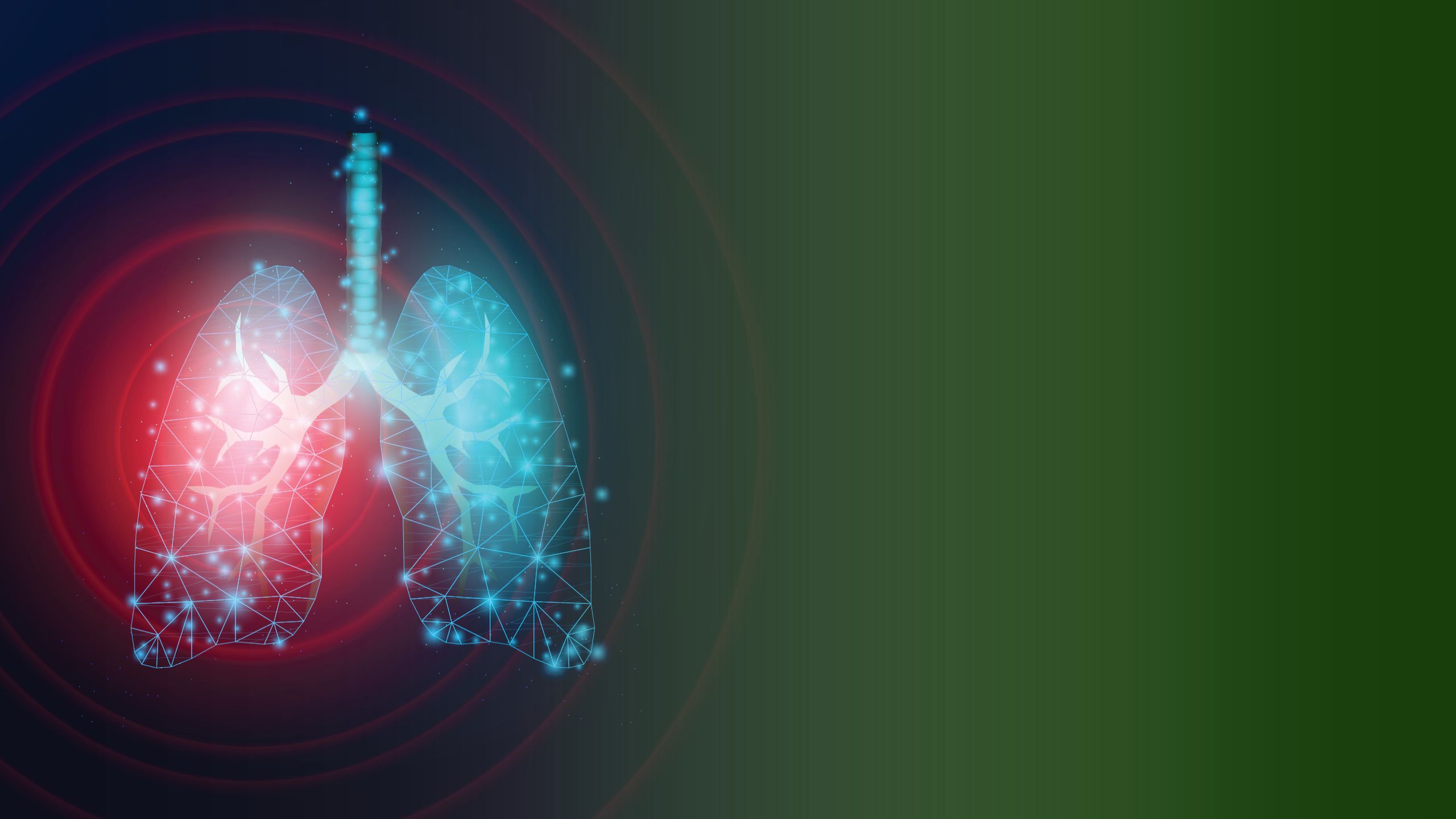
The research that gave her more time
Although Christy Erickson wasn't part of a clinical trial, she benefited from groundbreaking research that had been years in the making.
Much of that research was led by Suresh S. Ramalingam, executive director of Winship Cancer Institute of Emory University and one of the world’s foremost experts on non-small cell lung cancer (NSCLC) with EGFR (epidermal growth factor receptor) mutations. This specific subtype of lung cancer often affects nonsmokers, like Erickson, and can respond well to targeted therapies—if identified through genetic testing.
In June 2024, Ramalingam presented the results of the LAURA Phase 3 clinical trial on the largest stage in oncology: the plenary session of the American Society of Clinical Oncology (ASCO) Annual Meeting. His presentation of the remarkable data received a standing ovation.
The trial enrolled patients with unresectable stage III EGFR-mutated NSCLC who had not progressed after chemotherapy. Those treated with osimertinib experienced a median progression-free survival of 39.1 months, compared to 5.6 months for those on placebo—an 84% reduction in the risk of disease progression or death.
“These findings represent a major breakthrough,” Ramalingam says. “We now have a way to help patients with stage III lung cancer live longer without recurrence, and with fewer side effects.”
In early 2025, updated data from the LAURA trial further confirmed a favorable trend in overall survival, reinforcing osimertinib’s role as the new standard of care in this setting. Based on this data, the FDA expanded the drug’s approval to include patients with unresectable stage III EGFR-mutated NSCLC.
One of the key insights from the trial was osimertinib’s ability to reduce the risk of brain metastases, a common and significant complication of EGFR-mutated NSCLC.
“Preventing disease spread to the brain has a direct impact on quality of life,” says Ramalingam. “With osimertinib, we are able to manage this disease more like a chronic condition and keep patients feeling well longer.”
Although Erickson wasn't enrolled in the LAURA trial, she was treated with osimertinib after her tumor tested positive for an EGFR mutation. Her care team at Winship was guided by data from similar research studies, giving her access to personalized treatment that’s now redefining outcomes for patients with this subtype of lung cancer.
The LAURA trial is just one example of how clinical research fuels innovation in cancer care. “Every breakthrough we see today is built on years of scientific study, collaboration and a commitment to improving patient outcomes,” says Ramalingam. “That’s why ongoing clinical research is essential—it allows us to bring more precise, effective and hopeful treatments to the people who need them most.”
Care tailored to your needs
Care for patients with cancer at Winship includes leading cancer specialists collaborating across disciplines to tailor treatment plans to each patient’s needs; innovative therapies and clinical trials; comprehensive patient and family support services; and a care experience aimed at easing the burden of cancer.

More from Winship Cancer Institute
